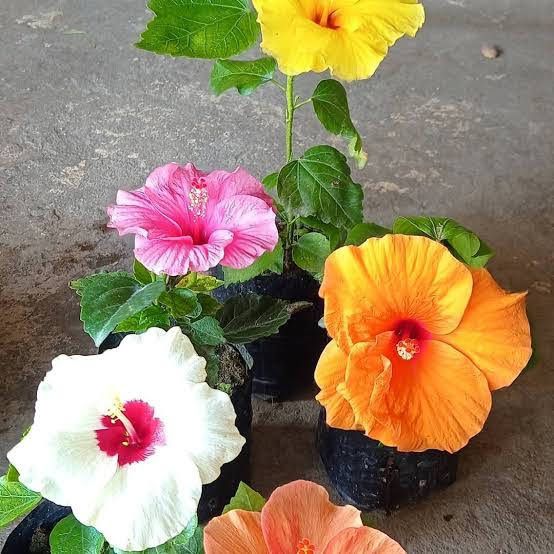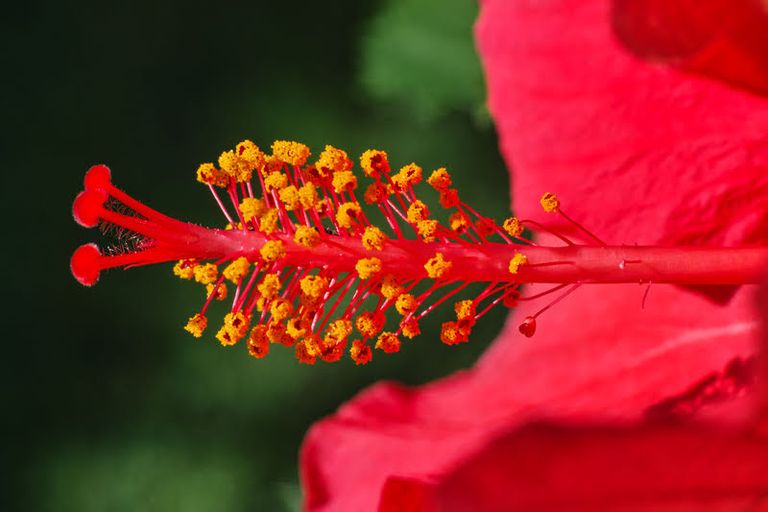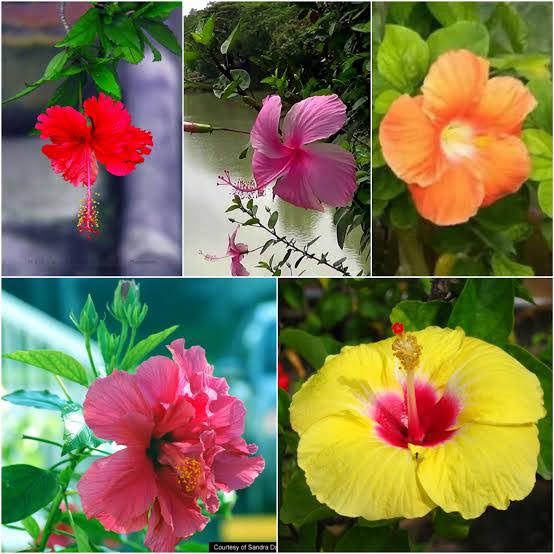
Hibiscus rosa-sinensis 'Brilliant'
Scientific classificationedit
Kingdom:
Plantae
Clade:
Tracheophytes
Clade:
Angiosperms
Clade:
Eudicots
Clade:
Rosids
Order:
Malvales
Family:
Malvaceae
Subfamily:
Malvoideae
Tribe:
Hibisceae
Genus:
Hibiscus
Species:
H. rosa-sinensis
Binomial name
Hibiscus rosa-sinensis
L.
Synonyms[1]
Hibiscus arnottii Griff. ex Mast.
Hibiscus boryanus DC.
Hibiscus cooperi auct.
Hibiscus festalis Salisb.
Hibiscus liliiflorus Griff. ex Mast.
Hibiscus rosiflorus Stokes
Hibiscus storckii Seem.Hibiscus rosa-sinensis is a bushy, evergreen shrub or small tree growing 2.5–5 m (8–16 ft) tall and 1.5–3 m (5–10 ft) wide, with glossy leaves and solitary (axillary), symmetrical, typically red flowers in summer and autumn. The five-petaled flowers are 10 cm (4 in) in diameter, with prominent orange-tipped red anthers.[6] Cultivars and hybrids have flowers in a variety of colors as well as red: white, pink, orange, peach, yellow, blue, and purple. Some plants have double flowers.[

Hibiscus rosa-sinensis, known colloquially as Chinese hibiscus,[2] China rose,[2] Hawaiian hibiscus,[2] rose mallow[3] and shoeblack plant,[4] is a species of tropical hibiscus, a flowering plant in the Hibisceae tribe of the family Malvaceae. It is widely cultivated as an ornamental plant in the tropics and subtropics, but its native range is Vanuatu.[5]
Hibiscus rosa-sinensis

At the bottom of every hibiscus bud is the calyx, which is green in color. The pointed ends of the calyx are called the sepals. When the hibiscus begins to bloom, the flower's petals begin to grow.
Each hibiscus flower has both male and female parts. The ovary and other female parts of the flower lie in the main structure of the hibiscus: the pistil, which is long and tubular. The five "hairy" spots at the top of the pistil make up the stigma, which is where pollen is collected. In the middle of the pistil is the style, which is the tube down which pollen travels to the ovary. The ovary lies at the bottom of the blossom, and each hibiscus has only one superior ovary. The male part of the flower, called the stamen, consists of stem-like filaments and anthers. Each filament ends with the pollen-producing anther.
The hibiscus plant has a branched taproot. The plant's stem is aerial, erect, green, cylindrical, and branched. The leaf is simple and petiolate, with alternate phyllotaxy. The leaf shape is ovate, the tip is acute, and the margin is serrated. Venation is unicostate reticulate, meaning the leaves' veins are branched or divergent. Free lateral stipules are present.
Thanks for supporting teams @r2cornell-curate
🚨🚨🚨Airdrop Alert 🚨🚨🚨
UHIVE Metaverse Adoption Airdrop
GET 100 STEEM and 30000 HVE2 Token Airdrop
On 20th June Uhive Started Their Official partnership with Hive and Steemit community.
For mass adoption towards metaverse they announced their Community Airdrop.
All the members from Hive and Steemit are Eligible for this airdrop.
Airdrop breakdown
This airdrop whitelist will be closed in 28th June
CLICK HERE TO JOIN AIRDROP WHITELIST NOW